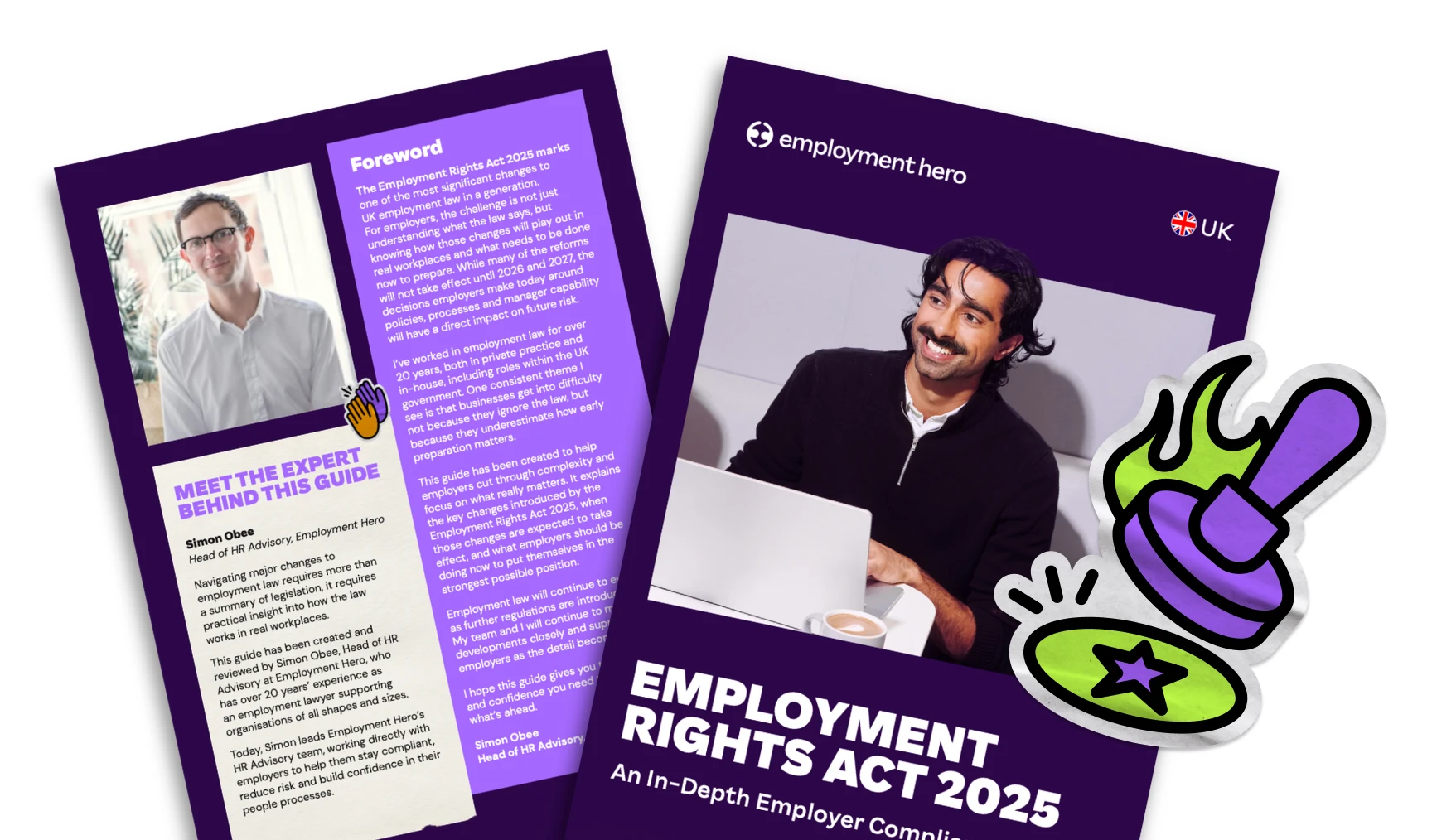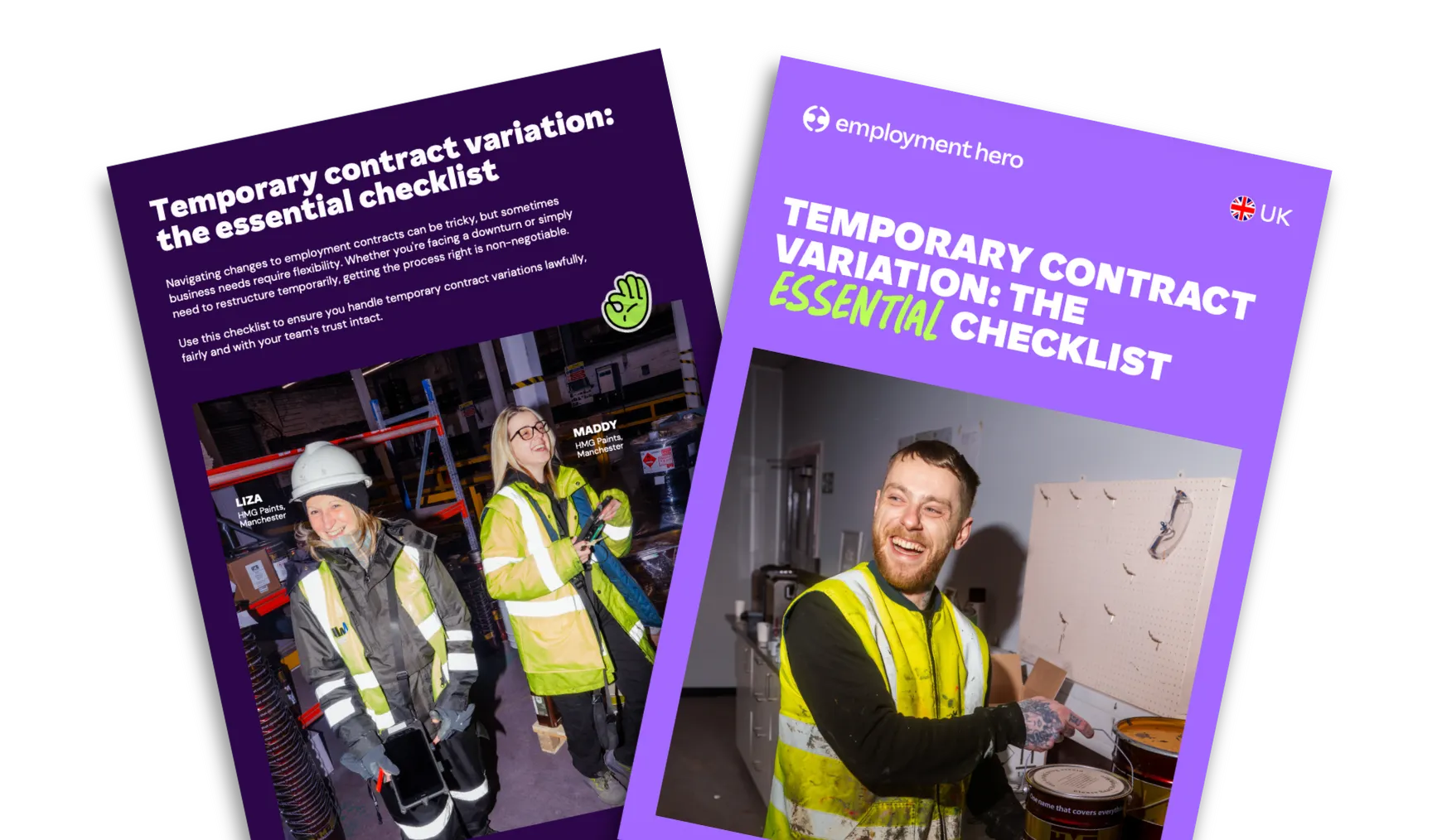Payroll Guide: The Basics of Payroll for HR Managers & Business Owners (UK)
Published
Payroll Guide: The Basics of Payroll for HR Managers & Business Owners (UK)
Published
A SMEs guide to UK Payroll
Are you a business owner or HR professional managing payroll? It can sometimes be a bit much – right? Not only is it daunting and time consuming, but there are also so many compliance elements you need to think about.
What if we told you it doesn’t have to be this hard. Hooray! It’s possible to simplify and streamline payroll with Employment Hero.
How? Take a read through our comprehensive guide to payroll that is designed to demystify the process, help streamline your operations, and ensure compliance, allowing you to focus on what really matters; growing your business and supporting your team.
Beyond Payroll
At Employment Hero, we understand that happy employees are at the heart of every thriving business. Payroll in the UK isn’t just about cutting checks; it’s about compliance, efficiency, and keeping your team engaged and motivated.
We know how time-poor SMEs can be, and that’s why we’ve developed an all-in-one platform to streamline HR and payroll processes. Our centralised platform is the world’s first Employment OS (Operating System), that flexes with your business needs.
What is payroll?
We know you probably already know what payroll is, but to make sure everyone is on the same page, let’s kick off by defining payroll.
Payroll is the process a business goes through to pay their employees. It encompasses a list of all employees and how much they are paid. Pay cycles can run weekly, bi-weekly or monthly, and are often managed by business owners, HR professionals or payroll professionals.
Payroll is more than just numbers; it’s the backbone of your business operations. Accurate and timely payroll ensures compliance with regulations, keeps employees satisfied, and maintains your financial stability. Here’s how:
- Compliance – Navigating payroll legislation can be overwhelming. From tax codes to National Insurance, a reliable payroll system helps you stay compliant and avoid fines.
- Employee Satisfaction – Paying employees accurately and on time keeps them happy and motivated, leading to increased productivity and loyalty.
- Financial Stability – Accurate payroll management keeps your financial records in order, essential for budgeting and financial planning.
Three key pillars of a great payroll
1. Legislation and compliance
Navigating the labyrinth of UK payroll legislation is a critical responsibility for any business owner. But we get that this probably isn’t your favorite task, so we thought we would make it a bit easier for you.
Staying compliant is non-negotiable. Recent changes to UK payroll laws and regulations include:
- Increased National Minimum Wage (NMW) and National Living Wage (NLW) rates – Update your payroll systems and review pay scales to comply and avoid penalties.
- Changes to National Insurance Contributions (NICs) – New thresholds and rates require updates to payroll calculations to avoid underpayments or overpayments.
- New tax bands and allowances – Reflect these changes in your payroll systems for correct tax deductions and to avoid HMRC fines.
- Enhanced Statutory Sick Pay (SSP) and parental leave pay – Update your payroll systems to ensure compliance and correct entitlements for employees.
- Changes to pension auto-enrolment requirements – Adjust your payroll systems for new auto-enrolment earnings thresholds and minimum contribution rates.
2. Choosing the right fit for you
Selecting the right payroll system is crucial for efficiency and accuracy. Here’s a breakdown of different UK payroll software options for SMEs:
- Old-school payroll – Suitable for businesses with fewer than 10 employees. This method involves spreadsheets and manual calculations, which can be time-consuming and error-prone.
- Traditional payroll software – Ideal for SMEs looking to automate basic payroll calculations but still require manual updates. It often operates in isolation from HR systems.
- Payroll software (Employment Hero) – Designed for SMEs seeking efficiency, accuracy, and seamless integration. Our software automates calculations, manages HR and payroll from one place, and includes proactive error checking and compliance support.
- Managed Payroll Services (MPS): Suitable for businesses that prefer to outsource payroll entirely, reducing administrative burden but at a higher ongoing cost.
3. Embracing the future of payroll
Automating payroll can be a game changer for businesses of all sizes. Employment Hero offers advanced tools and features to simplify payroll tasks and enhance business operations. Benefits include:
- Automated calculations – Run payroll quickly and accurately, covering wages, tax deductions, and benefits.
- Real-time reporting – Get detailed payroll reports instantly for better financial decision-making and audit readiness.
- Automated compliance updates – Stay up-to-date with the latest laws and regulations without any manual effort.
- Self-service portals – Enable employees to access payroll information anytime, reducing HR admin work and providing instant access to payslips and tax documents.
Ten things to remember when payroll processing
Payroll processing is the administrative task of calculating and distributing employee pay – basically everything involved when running payroll. This includes determining the correct amount of taxes and deductions to without from an employee’s earnings, as well as ensuring they are paid on time. It also involves filing reports and paying employment taxes to HMRC.
It’s important to remember that all of this must be done with enough time to follow the set pay schedule and following compliance regulations.
When someone’s income depends on you, it’s no small responsibility, so it’s important you get it right.
Here are our top ten things to remember to nail payroll processing every time.
1. Start with clean data
One of the biggest struggles with payroll management in HR is employee misclassification, this can include:
- Typos
- Spelling errors
- Incorrect information
Usually misclassification happens during the onboarding stage, and it can impact things such as employee private health care, retirement benefits or tax.
To avoid these problems, make sure any information you have is correct for all employees. We recommend asking your employees to verify their personal information and tax code prior to receiving their first pay.
2. Verify timesheet information
For businesses that have employees who work shifts or variable hours, making sure your timesheets are accurate is essential. Putting preventative measures in place can save your business time and money.
Although this step can be done manually, we suggest putting a system in place, or using payroll software to automatically check for inconsistencies with employee type, hours worked and pay scale.
3. Know your total payroll costs
As delved into in our employer guide to payroll, the process encompasses so much more than just employees wages. And the only way to effectively budget is by having a comprehensive view of your costs.
Elements employers should factor in include:
- Gross pay
- Benefits
- Tax
- National Insurance
The best way to make sure you’re not overspending is by using a payroll budgeting tool, that helps you stay on top of all costs related to your people processes.
4. Produce and distribute payslips
Payslips are the element of the payroll process that everyone thinks about, and in order to comply with UK law, and keep employees happy, it’s essential to send every employee a payslip at the end of each cycle.Although you can print and hand your employees payslips, we think it’s far better to send them electronically!
Employee payslips must include:
- Gross pay
- Deductions
- Net pay
- Hours worked for the period
Whilst not a legal requirement, they can also include:
- Tax code
- National Insurance number
- Pay rate
- Deductions year-to-date
5. Make payments and file reports on time
As most small business owners and HR professionals know, filing reports and making payments to the HMRC is an essential task. Each month, you are responsible for paying HMRC the tax and National Insurance you owe as reported on your Full Payment Submission (FPS) in the previous tax month, minus the reductions on any Employer Payment Summary (EPS) you sent before the 19th in the current tax month.
It’s important to keep in mind that HMRC will send you a late filing notice if you’ve paid any employees and have not sent an FPS. You may also be charged a penalty unless you have a valid reason for reporting late, and no one wants that, do they?
The best way to avoid late filing is to keep track of important payroll dates, think a wall planner or an online calendar, and be sure to include bank holidays that could impact filing.
6. Complete annual reports
It’s not only monthly reports you need to be mindful of, but also annual reports. We get it, sometimes it feels like filling out reports is a full time job. But the alternative is fines and not being compliant, which is not an option.
All businesses need to report to HMRC on the previous tax year and prepare for the following tax year. This must include your employee’s pay, payroll benefits and deductions in an FPS.
To prepare for the new tax year, you’ll need to manage the Payroll Year End process. For more information about PYE, check out our guide.
7. Keep records
When you’re running a business, or managing payroll, it’s easy to forget that HMRC can check your files at any time. The last thing you want is to be scrambling to find the information they have requested.
Luckily the solution to this is relatively simple. Effective record keeping. Want an industry secret? It’s much easier when you use a HR and payroll platform!
By keeping up to date records, you’ll be able to respond quickly if either HMRC or one of your employees has any queries regarding payroll data.
8. Understand minimum wage regulations
The National Living Wage and National Minimum Wage requirements are legally binding. Meaning, if you are paying your employees less than that, you’re not compliant with UK law. And nobody wants that!
But what are National Living Wage and National Minimum Wage?
National Living Wage: the hourly rate to which all employees aged over 21 are legally entitled.
National Minimum Wage: applies to people who are at least at the school-leaving age.
Be mindful that they do change each tax year, so make sure you keep an eye on UK legislation.
9. Keep up with compliance
Compliance is a non-negotiable for businesses. But staying up to date with payroll legislation isn’t always easy. Especially when they are continually evolving.
You should take advantage of resources such as Gov.uk, Advisory services, or payroll platforms to help understand what changes will mean for your business as they happen.
10. Simplify tasks with Employment Hero
Managing payroll is difficult, especially when you’re a business owner wearing many hats, or a HR professional managing payroll as part of your duties. It’s impossible to do it all, and there’s nothing wrong with asking for a little help.
This is where software such as Employment Hero can come in handy. Allow Employment Hero’s free payroll feature to take some of the manual tasks off of your hands, so you can focus on more strategic initiatives. For more complex requirements, the Employment Hero platform has advanced features to streamline payroll processes.
More simplified payroll. What’s not to love?
What to look out for at Payroll Year End
One of the busiest times of the year for payroll is Payroll Year End (PYE), this refers to the end of the tax year for payroll purposes and involves tasks such as submitting final payroll reports, issuing P60’s to employees and adjusting tax codes for the upcoming tax year.
Some of the key dates business owners or HR professionals managing payroll need to keep in mind are:
- 5th April – The most recent tax year ends
- 6th April – The new tax year begins
- 19th April – The deadline for the final submission for the previous tax year
- 22nd April – The deadline for month 12 PAYE
- 31st May – Your employees need to have received their P60s by this date
- 6th July – Report on expenses and benefits by this date and deadline for submitting your P11D and P11D(b) forms
- 22nd July – Payment of Class 1A National Insurance contributions on Benefits in Kind need to be submitted to HMRC (19th July is the deadline if not using digital systems)
To learn more about how your business can prepare for PYE, download our checklist.
Is it time to automate your payroll?
Here are 5 tell-tale signs it’s time to automate your payroll.
- Growth plans – If your business is expanding, manual processes might not suffice. Transitioning to payroll software ensures efficiency as you scale.
- Payroll complexity – Managing diverse pay scales, bonuses, and benefits? Automation simplifies complexities and reduces errors.
- Internal resources – Investing in UK payroll software can streamline your HR team’s workload, boosting efficiency and productivity.
- Budget considerations – While manual processes have low upfront costs, they can be time-consuming and error-prone. Payroll software offers long-term savings through efficiency.
- Need for integration – Manage HR and payroll seamlessly from one platform. Employment Hero’s payroll solution integrates smoothly with existing HR and accounting software.
Payroll, simplified with Employment Hero
It’s essential for payroll to be done right. But that is often easier said than done. So if you’re tired of wasting time on payroll tasks, or worrying about staying compliant, Employment Hero could be the solution.
Employment Hero’s Employment Operating System (OS) takes the traditional isolated aspects of employment and integrates them into a seamless, human and AI-powered solution that empowers employers, employees and job seekers alike.
Find and hire top talent with SmartMatch, seamlessly onboard new hires, automate complex payroll, drive employee engagement and more!
Our all-in-one system puts HR, payroll, hiring and more all in one place.
One system. Everything employment.
Download the guide today.
To download the guide, we just need a few quick details:
Related Resources
-
 Read more: Ask the Experts: How the Employment Rights Act 2025 Will Change Employer Compliance
Read more: Ask the Experts: How the Employment Rights Act 2025 Will Change Employer ComplianceAsk the Experts: How the Employment Rights Act 2025 Will Change Employer Compliance
The Employment Rights Act 2025 introduces major changes for UK employers. See what’s changing, key dates, and how to prepare…
-
 Read more: A UK Employers Guide to Building a Candidate Pipeline
Read more: A UK Employers Guide to Building a Candidate PipelineA UK Employers Guide to Building a Candidate Pipeline
Published The traditional approach to hiring; you know the drill, write and post a job advert and hope to attract…
-
 Read more: Temporary variation of employment contracts: an employer’s checklist
Read more: Temporary variation of employment contracts: an employer’s checklistTemporary variation of employment contracts: an employer’s checklist
Learn how to manage a temporary variation of contract. Understand legal consent, documentation and compliance with employment law.



















